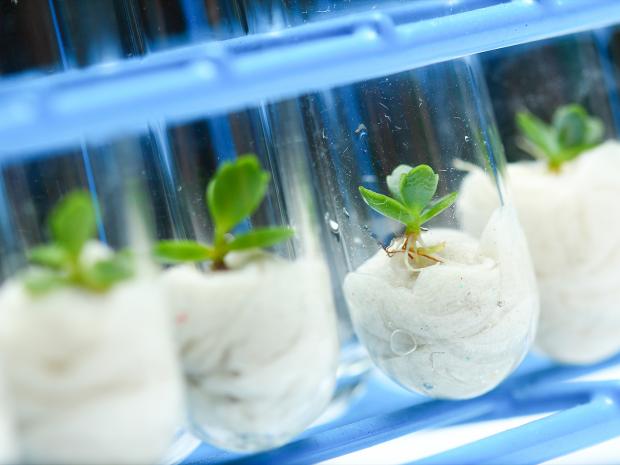- Academics
Biotechnology, M.S.

Biotechnology is a swiftly growing industry. From the food grown at our farms to the medicine we buy and the ways we clean up the environment, biotechnology affects many facets of our daily lives. Major developments in the field occur every day, with many introduced by academic and professional communities before the greater public is even aware of industry advancements.
At the School of Engineering, you’ll join in these exciting discoveries. Course topics range from industrial application of enzymes and bio-polymer synthesis to modern drug design and the role of biotechnology in health care. The availability of various and varied electives enables you to specialize in selected biotechnology areas.
The program also includes Advanced Cell and Molecular Biology and Genetic Engineering courses, both with labs. Students can further enhance their research and analytical skills by registering for a Guided Study course. Taking two such courses will enable students to complete a body of research work equivalent to a master's thesis (optional). Students can also take a business- or management-related course from Biotechnology and Entrepreneurship M.S.
Other electives are available for both programs. For further details please visit Biotechnolgy, M.S. curriculum below and the Biotechnology and Entrepreneurship, M.S. curriculum.
With advisor’s permission students can take courses at other Schools of NYU.
There are ample research/internship opportunities available at NYU and NYC at large. For example, many Biotech M.S. students participate in research projects at the NYU Langone Medical Center, the world-renowned Memorial Sloan Kettering Cancer Center, and other research institutions in the city. There are also internships in Biotech start-ups. All students can, of course, apply for summer internships at big pharmaceutical companies. To learn more about these opportunities see what our students say below.
Find out about Admission Requirements.
Curriculum
Degree Requirements
The 30-credit curriculum of the Biotechnology, MS program consists of 3 parts:
- 5 required courses in biotechnology, protein and tissue engineering, enzyme catalysis, and biosensors (15 credits)
- 3 elective courses in biotechnology and related fields (9 credits)
- 2 more elective courses or Guided Studies in Biotechnology, involving laboratory or literature work (6 credits)
To meet graduation requirements, students must attain an overall GPA of 3.0 (average of a B) in all their courses.
Required Courses (15 Credits)
- 3 Credits Biotechnology and the Pharmaceutical Industry BT-GY 6013
- The course offers an in-depth look at the modern process of drug development, from the early stage of target identification and generation of lead compounds to modern methods of drug delivery and the role of biotechnology in this complex process. All the key aspects, including preclinical development, clinical trials and regulatory requirements, are covered with considerable contributions from pharmaceutical professionals. Real-life case studies are presented to illustrate critical points in the development process. Major classes of biotech drugs are discussed. Many course lectures are delivered by scientists from the major U.S. pharmaceutical companies.
Prerequisite: Adviser’s approval. - 3 Credits Biotechnology and Health Care BT-GY 6023
- Biotechnology’s contribution to modern health care stretches far beyond developing new therapeutic entities. This course provides an overview of key cutting-edge technologies such as stem-cell research and therapeutic cloning and demonstrates how their applications change “the conventional” in terms of availability of new treatments, monitoring services and diagnostics. The course also covers the Human Genome Project and its implications for health care and epigenetic modifications of the genome and their role in disease. The course also highlights the role of biotechnology in managing a number of sociologically high-impact diseases in developed and developing countries.
Prerequisite: Adviser’s approval. - 3 Credits Biosensors and Biochips BT-GY 6033
- Biosensors and biochips are two of the most exciting, complex and fast-growing areas of biotechnology today—the interface between biotechnology, nanotechnology and micro-electronics industries. The course covers both conventional biosensors based on whole cells, nucleic acids, antibodies and enzymes (e.g., enzymatic glucose monitoring) as well as new and emerging technologies related to designing, fabricating and applying multi-array biochips and micro-fluidic systems (lab-on-the-chip). The course goal is to familiarize students with basic principles of biosensors design and applications. The course also covers practical applications of this technology in health care, medical diagnostics, defense and other areas.
Prerequisite: Adviser’s approval. - 3 Credits Biocatalysis in Industry BT-GY 6043
- The course focuses on the commercial use of biological catalysts across various industry segments, including pharmaceuticals, health care, fine chemicals and food. The course combines a broad overview of cutting-edge technologies with industrial insights into the economics of bio-processing. The course also covers emerging biomaterials trends. Case studies are presented to facilitate analysis, formulate trends and underline major challenges.
Prerequisite: Adviser’s approval.
Choose One:
- 3 Credits Protein Engineering BT-GY 9433
- This course introduces modern protein-engineering techniques available to researchers to understand protein structure and function and to create entirely new proteins for many purposes. This new field lies at the interface of chemistry, biology and engineering. The first section discusses protein composition and structure, and various genetic, biochemical and chemical techniques required to engineer proteins, followed by specific topics. Topics include designing highly structured proteins that are active at high temperatures and in non-aqueous solvents; that interact selectively with other proteins, small molecules and nucleic acids for therapeutic purposes; and that catalyze new reactions.
Prerequisite: Adviser’s approval. - 3 Credits Biomedical Materials & Devices for Human Body Repair BT-GY 6093
- The main objective of this multidisciplinary course is to provide students with a broad survey of currently used biomaterials and their use in medical devices for reconstructing or replacing injured, diseased, or aged human tissues and organs. Topics include a broad introduction to the materials used in medicine and their chemical, physical, and biological properties, basic mechanisms of wound healing and materials-tissue interactions.
Advisor/Instructor Permission Required
Elective Courses (9-15 Credits)
You must take from 3 to 5 courses from the list shown:
- 3 Credits Introduction to Neuroscience for Biotechnologists BT-GY 6053
- The understanding of brain function represents a unique challenge by virtue of the tremendous complexity of neural circuits and their role in controlling behavior. This course is designed to provide graduate students with a comprehensive introduction to the basic mechanisms of brain function. It covers the basic mechanisms of neuronal excitability, how neuronal function is connected to cellular structures, how neurons act as elements of networks and how malfunctions lead to mental and neurological disorders. The goal is to provide graduate students a foundation of knowledge which will guide them in their decision to enter and navigate the vast field of neurobiology.
Advisor/Instructor Permission Required - 3 Credits Immunology: Concepts, Mechanisms and Applications in Biotechnology BT-GY 6063
- The purpose of this course is to develop a general understanding of the established biochemical, molecular, cellular, and organ-level principles that govern the workings of the mammalian immune system, and to prepare the student for immunological research in the academic, government, or industrial laboratory. Topics covered include cells of the immune system and their development, pattern recognition receptors and innate immunity, molecular mechanisms of antigen processing and presentation, long distance communication and immune cells’ migration, homing, and trafficking. Applications in Biotechnology and autoimmune diseases and the use of immunotherapy in industry will also be discussed.
Advisor/Instructor Permission Required - 3 Credits Genetic Engineering BT-GY 6073 With Labs
- Genetic engineering underpins practically every aspect of modern biotechnology. This course aims at familiarizing students with the current methods of DNA manipulation and practical applications of recombinant DNA technology, including the use of vectors, construction of libraries, PCR, restriction digests, mapping, and cloning. The class includes lectures as well as a semester-long 3h/week lab.
Advisor/Instructor Permission Required - 3 Credits Advanced Cell and Molecular Biology BT-GY 6083 With Labs
- The course aims to advance students' knowledge in key areas of cell and molecular biology. Topics covered included cell-cell communications, organization of the cytoskeleton, mechanisms of cell signaling and signal transduction, chromatin organization and structure and genome regulation, maintenance and repair. The lab component of the class is designed to provide students with advanced bench-top skills used in modern cell and molecular biology experimentation.
Advisor/Instructor Permission Required - 3 Credits Biomedical Materials & Devices for Human Body Repair BT-GY 6093
- The main objective of this multidisciplinary course is to provide students with a broad survey of currently used biomaterials and their use in medical devices for reconstructing or replacing injured, diseased, or aged human tissues and organs. Topics include a broad introduction to the materials used in medicine and their chemical, physical, and biological properties, basic mechanisms of wound healing and materials-tissue interactions.
Advisor/Instructor Permission Required - BE-GY 6703 Please refer to the bulletin for more information
- 3 Credits Special Topics in Biotechnology BT-GY 7013
- Special topics include a number of courses, such as Advanced Cell Biology and Advanced Molecular Biology (lectures only or lectures and labs).
Prerequisite: Adviser’s approval. - 3 Credits Computer-aided Protein and Drug Design BT-GY 7043
- This course is aimed at familiarizing students with the fundamental principles of computational drug design, including both engineered protein drugs (biologics) and small molecules. Basic concepts in bioinformatics, cheminformatics and molecular modeling (homology modeling, ab initio structure prediction, computational molecular docking) will be taught as a foundation for advanced, specific case studies in protein engineering and drug design applied to specific biomedical problems such as cancer and infectious diseases.
Prerequisites: Advisor's or instructor’s permission - 3 Credits Project in Biotechnology II BT-GY 8723
- Special project (experimental, theoretical, computational, or literature search).
Prerequisite: Adviser’s approval.
Guided studies (Up to 6 Credits)
You may take up to 2 guided studies courses (1 per semester), which involve laboratory or literature work, as arranged with your adviser:
- BT-GY 8713 Please refer to the bulletin for more information
- 3 Credits Project in Biotechnology II BT-GY 8723
- Special project (experimental, theoretical, computational, or literature search).
Prerequisite: Adviser’s approval.
Subject to advisor’s approval students can also take an elective course and/or do research at other Schools of NYU. Typically, Biotechnology students choose NYU School of Medicine.
Compare to Biotechnology and Entrepreneurship, M.S.
Goals and Objectives
| Biotechnology, M.S. | Biotechnology and Entrepreneurship, M.S. |
| The program aims to advance students’ knowledge beyond the BS level and equip them with the skills needed in the rapidly evolving environment of life sciences-based industries. Suitable for students who plan to pursue careers in industrial and/or academic research. | The program is designed to provide students with a broad coverage of key areas of modern biotechnology and a basic understanding of business and finance issues. Suitable for students who are interested in early stage technology companies and/or aspire to start their own business. |
Courses
| Biotechnology, M.S. | Biotechnology and Entrepreneurship, M.S. | |
| Biotechnology and Pharmaceutical Industry | Required | Required |
| Biotechnology and Health Care | Required | Required |
| Biosensors and Biochips | Required | Required |
| Biomedical Materials and Devices | Elective | Elective |
| Protein Engineering | Required | Elective |
| Tissue Engineering | Elective | Elective |
| Biocatalysis in Industry | Required | Required |
| Neuroscience | Elective | Elective |
| Immunology: Concepts, Mechanisms and Applications | Elective | Elective |
| Genetic Engineering (with labs) | Elective | Elective |
| Advanced Cell and Molecular Biology (with labs) | Elective | Elective |
| Biomedical Materials and Devices | Elective | Elective |
| Entrepreneurship and Venture Creation | Not offered | Required |
| A Guided Study or Project in Biotechnology | Elective | Elective |


